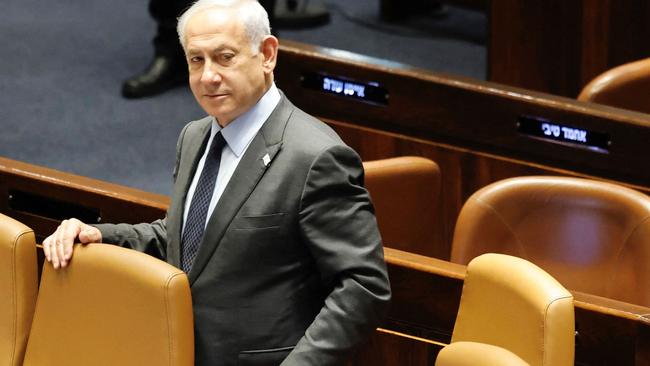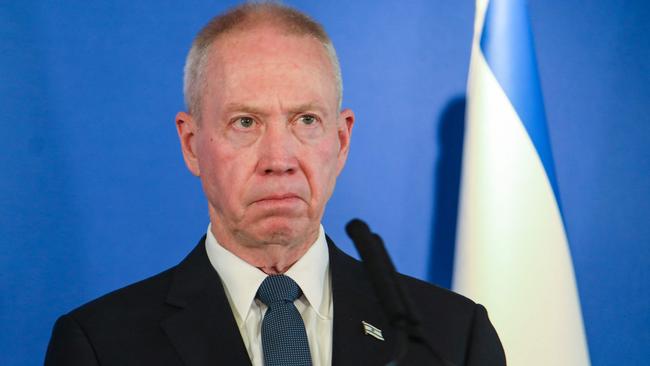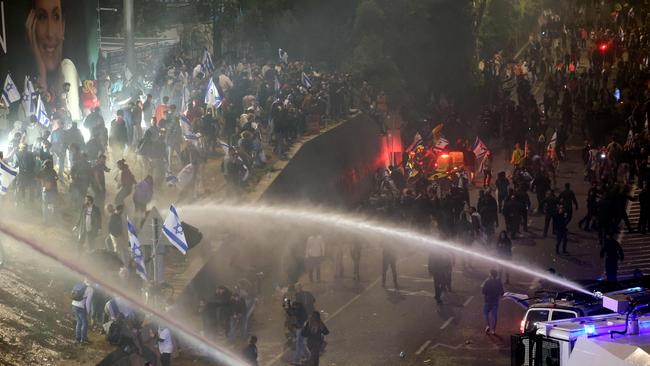Benjamin Netanyahu suspends judicial reform plan
The Israeli PM postponed reform after anti-government protests and strikes rocked the country and threatened his coalition’s grip on power.

Israeli Prime Minister Benjamin Netanyahu suspended Monday a controversial judicial overhaul plan that has divided the country, after anti-government protests and strikes rocked the country and threatened his coalition’s grip on power.
“I will give a genuine opportunity for genuine dialogue,” said Mr Netanyahu. “One way or another, we will bring about a reform that returns the balance that has been lost between branches of government.”
Earlier Monday, Israeli President Isaac Herzog warned that the judicial overhaul plan threatened the economy and national security as he called on the coalition government to put aside political considerations for the sake of the nation. “The entire nation is rapt with deep worry, ” he said. “Wake up now!”
Israel’s largest labour union on Monday announced a nationwide strike over Mr Netanyahu’s judicial overhaul plan that grounded flights, closed banks, government offices, some malls and ports, and left hospitals working with skeleton crews.
That came after Mr Netanyahu on Sunday fired his defence minister, Yoav Gallant, who had called for the premier to halt the legislation. The firing sparked hundreds of thousands of Israelis to take to the streets across the country, with demonstrators gathering outside Mr Netanyahu’s home in Jerusalem and protesters setting large fires on Tel Aviv’s main highway.

On Monday, tens of thousands of people rallied again across the country. Thousands flooded into the streets surrounding Israel’s parliament, or Knesset, in Jerusalem, and Supreme Court, chanting “democracy or rebellion” and waving blue-and-white Israeli flags.
On Monday evening, ultranationalist politician Itamar Ben-Gvir, one of the last holdouts in Mr Netanyahu’s coalition, said he would no longer stand in the way of delaying the legislation. Mr Ben-Gvir said he would support a delay as long as Mr Netanyahu guaranteed it would be voted on once parliament resumes its work in the summer after going into recess at the end of the week.
From the streets of Tel Aviv to the halls of the Knesset, Mr Netanyahu is facing a revolt over his proposed judicial overhaul that is threatening the ruling coalition’s grip on power. Israel’s parliament was poised to vote this week on the first pillar of the overhaul, which would give the coalition a majority on the committee that appoints judges, although some appointments would still require compromise. Other parts of the overhaul aim to limit the Supreme Court’s jurisdiction and allow a simple majority of politicians to override the court’s decisions.
Both supporters and opponents of the overhaul say they are defending the soul of Israel’s democracy.

Mr Netanyahu and his ultranationalist and religious allies have long argued that the courts are controlled by liberal, activist judges who can too easily overturn the will of elected politicians. They say the courts have seized wide-ranging powers and become a bastion of minority rule, striking down laws supported by a majority of Israelis, such as those cracking down on African asylum seekers.
The parties also seek to pass laws that would strengthen the role of religion in public life – legislation that would likely also be struck down by the country’s Supreme Court in its current form.
Thousands of pro-overhaul demonstrators flooded an intersection near Israel’s Supreme Court after Mr Ben-Gvir and other ultranationalist politicians called for them to come out. Protesters carried signs demanding that the judicial overhaul be carried out immediately.
“Democracy is the majority we got at the ballot box,” said Shachar Chay, 18, who lives in the West Bank settlement of Itamar. “These are just protests against [Mr Netanyahu]. But you lost, sorry.” Mr Netanyahu’s ultranationalist bloc called for a counterprotest in Jerusalem Monday night.
The opposition says the bill would weaken Israel’s already frail system of checks and balances and undermine democracy and protections for minorities. Many say the overhaul would deal a fatal blow to Israel’s democratic character.
The debate over Israel’s top court is partly explained by ambiguity in the country’s legal system that dates back to its founding. Israel doesn’t have a written constitution as some other Western countries do. Instead, the court bases its decisions on British common law, evolving Israeli precedent and a series of basic laws, which provide quasiconstitutional powers.

As part of the general strike, banks, government offices, utility companies and some schools will also close their doors, said Histadrut, Israel’s largest trade union. It would be the first such strike in the country for over a decade.
In the past three months, up to half a million Israelis have come out every weekend to protest in the small country of nine million people. Late on Sunday, the unrest intensified after Mr Netanyahu fired Mr Gallant who warned the legislation was imperilling national security – as the ruling coalition prepared to move it in parliament this week.
Gil Saig, 48, from Tel Aviv, was one of thousands of protesters who gathered at demonstrations around the city on Monday. He said he had joined the protests for 12 straight weeks and wouldn’t stop until the legislation is “put in the garbage dump of history.” Mr Saig described the legislation as a “regime coup” and said Israel needs a constitution that would enshrine human rights so another government won’t attempt a similar overhaul. “We must win this battle because maybe we won’t have a second chance,” he said.
Mr Gallant said on Saturday that the overhaul had sparked division within the military that was becoming a national-security threat, as many reservists have said they won’t serve in the military if the overhaul passes. He said the rift was causing a “clear, immediate and tangible threat to the security of the country.” Scores of Israeli reservists, from elite pilots to intelligence officers, have said they would refuse to serve if the judicial overhaul is passed, breaking a taboo in a country that reveres military service as a sacred national duty.
Israeli security officials have also warned the crisis could damage Israel’s military which is reliant on reservists, as tensions rise with regional foes such as Iran and with Palestinian militants in the occupied West Bank and Gaza.
Rotem Serphos, 33, a high-school math teacher from Haifa who came to Tel Aviv to join the protests, said he won’t report for reserve duty if the overhaul goes through. “We want to shred the reform and start from the beginning,” he said. He called on Mr Netanyahu to resign and said any new process aimed at changing the judiciary would need wide support from the opposition.
A suspension of the overhaul plan risks the collapse of Mr Netanyahu’s coalition, as some of his right-wing and religious allies are adamant on pushing ahead with the legislation.
As civil unrest spread across the country late on Sunday night, two ultra-Orthodox parties in Mr Netanyahu’s coalition said they would back the premier, whether he chose to halt the legislation or not. On Monday, Justice Minister Yariv Levin, a key architect of the judicial overhaul, said he would support any decision made by the premier.
Since the overhaul was announced three months ago, it has been opposed by top economists, Israel’s technology sector, senior jurists and security officials, who said it would undermine the checks and balances of the country and hand near-unchecked power to the ruling coalition. Hundreds of thousands of Israelis have participated in mass demonstrations for almost three months against what they call the threat of dictatorship.
Abroad, key allies including the U.S. and Germany have expressed concerns over the independence of Israel’s judiciary should the revisions pass.
“We are deeply concerned by today’s developments out of Israel, which further underscore the urgent need for compromise,” Adrienne Watson, a spokeswoman for the U.S. National Security Council, said late Sunday.
After Sunday night’s protests, several senior Likud ministers said they would back Mr Netanyahu if he decides to halt the legislation.
“I call on my friends in government, in the Likud and other coalition parties to unite around the prime minister and support him in halting the legislation. We cannot bring about the toppling of a right-wing government by our hands,” tweeted Nir Barkat, a senior Likud member and economy minister.
Photos: Why Israelis Are Protesting Yet even as the overhaul’s future remained uncertain, politicians on Monday morning passed the bill out of committee as scheduled in preparation for a final round of voting in the Knesset.
Amid pressure at home and abroad, Mr Netanyahu’s coalition amended part of the overhaul plan slated to be voted on this week that would have handed the coalition near-total power to nominate judges. Instead, the coalition would appoint the first two Supreme Court justices during its tenure. The rest would require compromise with opposition politicians or judges.
Others in the Likud party’s hard-line base slammed any delay in passing the overhaul. Tally Gotliv, a Likud politician, said halting the legislation would mean “surrendering to civil unrest.” “What right to exist, as a coalition, would we have left?” Ms Gotliv tweeted on Monday morning.
Dow Jones






To join the conversation, please log in. Don't have an account? Register
Join the conversation, you are commenting as Logout